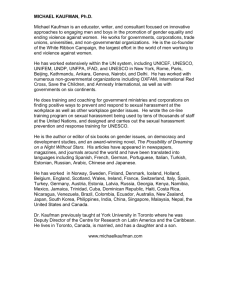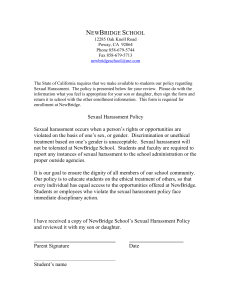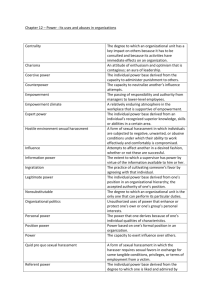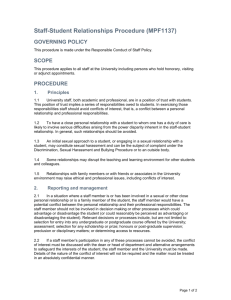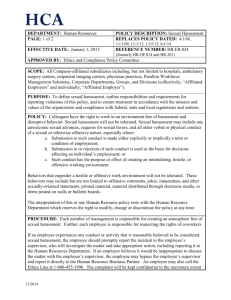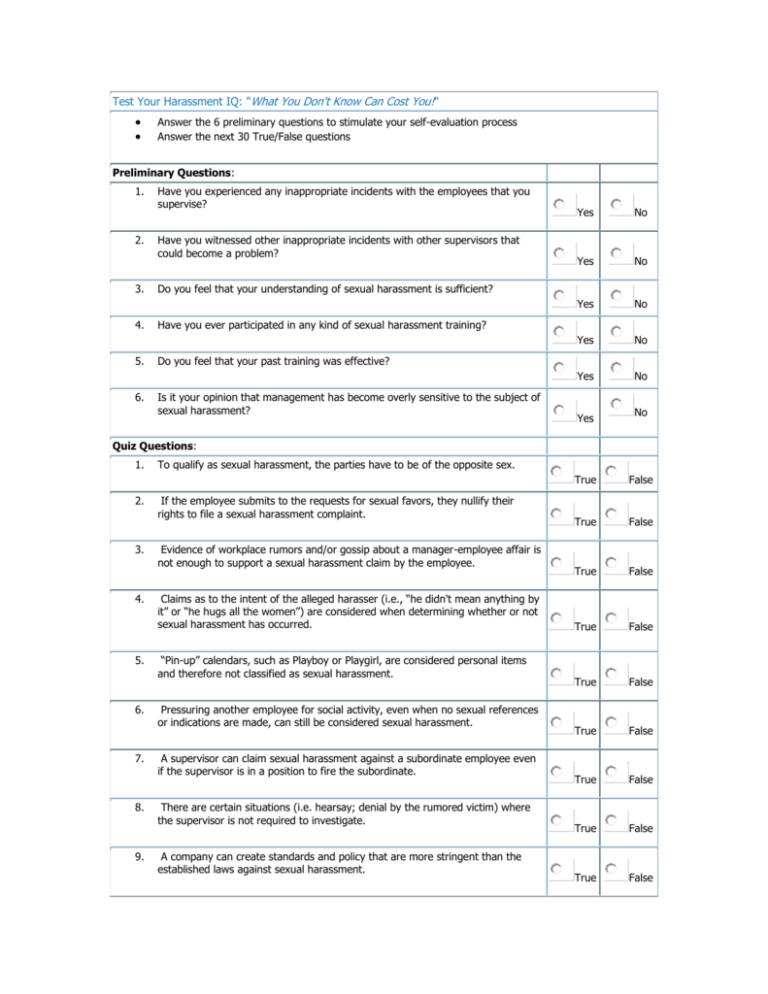
Test Your Harassment IQ: "What You Don't Know Can Cost You!"
Answer the 6 preliminary questions to stimulate your self-evaluation process
Answer the next 30 True/False questions
Preliminary Questions:
1.
2.
3.
4.
5.
6.
Have you experienced any inappropriate incidents with the employees that you
supervise?
Have you witnessed other inappropriate incidents with other supervisors that
could become a problem?
Yes
No
Yes
No
Yes
No
Yes
No
Yes
No
Do you feel that your understanding of sexual harassment is sufficient?
Have you ever participated in any kind of sexual harassment training?
Do you feel that your past training was effective?
Is it your opinion that management has become overly sensitive to the subject of
sexual harassment?
Yes
No
Quiz Questions:
1.
2.
3.
4.
5.
6.
7.
8.
9.
To qualify as sexual harassment, the parties have to be of the opposite sex.
If the employee submits to the requests for sexual favors, they nullify their
rights to file a sexual harassment complaint.
Evidence of workplace rumors and/or gossip about a manager-employee affair is
not enough to support a sexual harassment claim by the employee.
Claims as to the intent of the alleged harasser (i.e., “he didn't mean anything by
it” or “he hugs all the women”) are considered when determining whether or not
sexual harassment has occurred.
“Pin-up” calendars, such as Playboy or Playgirl, are considered personal items
and therefore not classified as sexual harassment.
Pressuring another employee for social activity, even when no sexual references
or indications are made, can still be considered sexual harassment.
A supervisor can claim sexual harassment against a subordinate employee even
if the supervisor is in a position to fire the subordinate.
There are certain situations (i.e. hearsay; denial by the rumored victim) where
the supervisor is not required to investigate.
A company can create standards and policy that are more stringent than the
established laws against sexual harassment.
True
False
True
False
True
False
True
False
True
False
True
False
True
False
True
False
True
False
10.
11.
Specific sexual references or actions are not necessary for a situation to be
defined as sexual harassment.
True
False
True
False
True
False
True
False
True
False
True
False
True
False
True
False
True
False
A sexual harassment lawsuit can be filed against an employee who discusses or
gossips about a separate incident of sexual harassment that has happened within
their company.
True
False
The employer can only be held liable for a supervisor’s harassment of an
employee if the employer should have been aware of the situation and failed to
take appropriate and corrective action.
True
False
True
False
True
False
True
False
True
False
It takes several incidents over a period of time to fully establish a hostile office
environment.
12. The company can be held liable for incidents of sexual harassment that occur at
an official company function during business hours between two consenting
parties.
13. If an incident of sexual harassment occurs at an official company function, the
employer is liable even if the event is held after hours or off company property.
14.
15.
16.
17.
18.
19.
20.
If a victim of sexual harassment requests to the supervisor that they not file a
report and that they can handle the situation themselves, the supervisor should
agree to the victim’s wishes.
Sexual harassment is most often found in industries where positions are
traditionally held by members of a single sex.
Sexual harassment tends to be power-driven rather than sexually-driven.
An employee wishing to report an incident of sexual harassment should follow
the established “chain of command” when reporting their claim.
Situations involving sexual harassment are usually self-contained, causing little
to no effect on the rest of the company as a whole.
21. Sexual harassment is a violation of Title VII of the Civil Rights Act of 1964 and
the Texas Commission of Human Rights Act.
22. Submission to the request for sexual favors does not negate the victim’s rights to
file a sexual harassment complaint.
23. Evidence of workplace rumors that a female employee was having an affair with
her supervisor is sufficient to support a sexual harassment claim by the female
employee.
24. An employee’s conduct of posing nude for two magazines would bar her Title VII
sexual harassment claim against her employer, who she alleged, showed her
pornographic film advertisements, talked about sex and made lewd gestures
towards her.
25. Pornographic pictures and sexually oriented jokes can constitute sexual
harassment, but “pin-up” calendars in a place where only men are present, can
not.
True
26. The employer does not have an obligation to investigate a report of sexual
harassment if the employer learns of the harassment from someone other than
the victim (hearsay evidence) and the victim does not want any action taken.
True
False
True
False
28. Acts of aggression, intimidation, hostility, rudeness, name-calling or other types
of abusive conduct directed towards one gender can be sexual harassment, even
though no sexual gestures or words are used.
True
False
29. An employer cannot be held liable for sexual harassment which occurs at a
company sponsored party or sports event when: The party or event is held away
from the business premises and the party or event occurs after regular business
hours.
True
False
27. A company may establish a policy that states “not even one instance of
unwelcome sexual harassment or offensive behavior in the work place will be
subject to disciplinary action,” even if the behavior does not meet the definition
of sexual harassment. For example, a company can establish a zero tolerance
policy for the use of profanity.
30. A prompt investigation followed by effective remedial action will mitigate
damages for a defendant Texas employer in a sexual harassment lawsuit.
True
False
False


